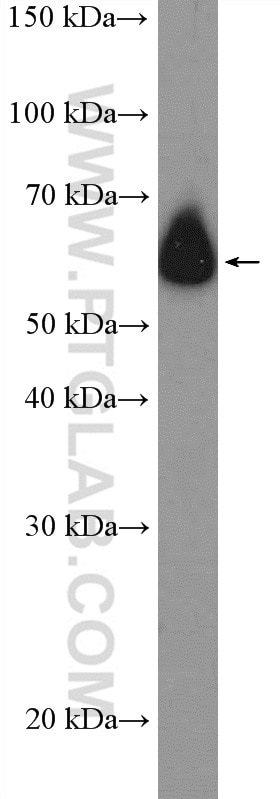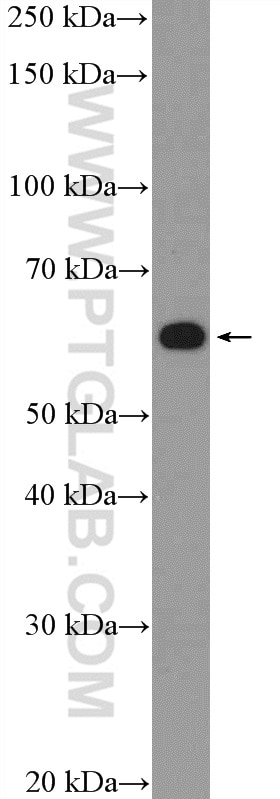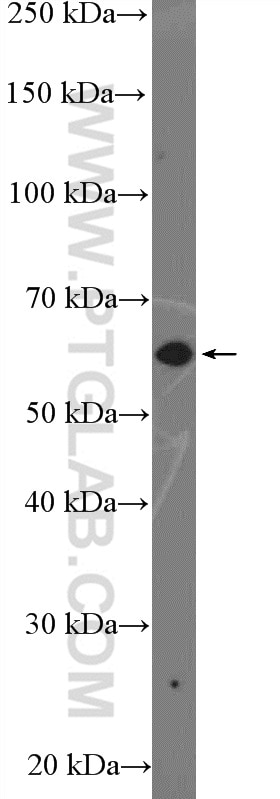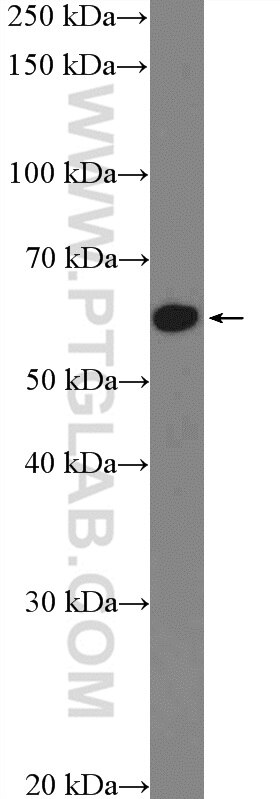Tested Applications
| Positive WB detected in | COS-7 cells, A549 cells, HEK-293 cells, MCF-7 cells |
Recommended dilution
| Application | Dilution |
|---|---|
| Western Blot (WB) | WB : 1:500-1:1000 |
| It is recommended that this reagent should be titrated in each testing system to obtain optimal results. | |
| Sample-dependent, Check data in validation data gallery. | |
Product Information
22161-1-AP targets ZNF154 in WB, ELISA applications and shows reactivity with human, monkey samples.
| Tested Reactivity | human, monkey |
| Host / Isotype | Rabbit / IgG |
| Class | Polyclonal |
| Type | Antibody |
| Immunogen |
CatNo: Ag17812 Product name: Recombinant human ZNF154 protein Source: e coli.-derived, PGEX-4T Tag: GST Domain: 20-165 aa of BC152404 Sequence: AVHFSWEEWGLLDEAQRCLYRDVMLENLALLTSLDVHRQKQHLGEKHFRSNVGRALFVKTCTFHVSGEPSTCREVGKDFLAKLGFLHQQAAHTGEQSNSKSDGGAISHRGKTHYNCGEHTKAFSGKHTLVQQQRTLTTERCYICSE Predict reactive species |
| Full Name | zinc finger protein 154 |
| Calculated Molecular Weight | 437 aa, 50 kDa |
| Observed Molecular Weight | 55-60 kDa |
| GenBank Accession Number | BC152404 |
| Gene Symbol | ZNF154 |
| Gene ID (NCBI) | 7710 |
| RRID | AB_2879012 |
| Conjugate | Unconjugated |
| Form | Liquid |
| Purification Method | Antigen affinity purification |
| UNIPROT ID | Q13106 |
| Storage Buffer | PBS with 0.02% sodium azide and 50% glycerol, pH 7.3. |
| Storage Conditions | Store at -20°C. Stable for one year after shipment. Aliquoting is unnecessary for -20oC storage. 20ul sizes contain 0.1% BSA. |
Background Information
Sites that display recurrent, aberrant DNA methylation in cancer represent potential biomarkers for screening and diagnostics. Previously, The hypermethylation at the ZNF154 CpG island in 15 solid epithelial tumor types from 13 different organs. The magnitude and reproducibility of the ZNF154 hypermethylation signal across five solid tumor types reinforces the potential of this site as a biomarker for circulating tumor DNA (ctDNA)(PMID: 26857064 ). The calculated molecular weight of ZNF154 is 50 kDa, but the modified ZNF154 protein is about 55-60 kDa.
Protocols
| Product Specific Protocols | |
|---|---|
| WB protocol for ZNF154 antibody 22161-1-AP | Download protocol |
| Standard Protocols | |
|---|---|
| Click here to view our Standard Protocols |










